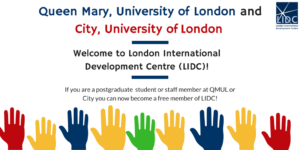Latest news
Welcome new LIDC members! City, University of London and Queen Mary, University of London become member colleges
August 25, 2017
We are very excited to announce that Queen Mary, University of London and City, University of London are now member colleges of London International Development Centre (LIDC)!
Welcome new members! As of August 2017 all staff and postgraduate students at Queen Mary and City University are able to become LIDC members and get involved in all of our activities, research and events.
We look forward to engaging with our new member colleges, if you are a staff member or postgraduate student at City or QMUL sign up to become a member of LIDC here to receive our newsletter and member benefits.
Upcoming LIDC activities
The LIDC Short Course: Evaluation for Development Programmes
This intensive short course will provide participants with a comprehensive background in evaluation methods for development programmes. Bursaries are available for LIDC members.
LIDC Grantmanship Series: Developing a winning GCRF proposal
This event is open to all academics at our member colleges and will consist of a panel session of past and present GCRF panel members, followed by time for discussion and questions on the development of a GCRF application.
This debate will be looking at short term international volunteering and discussing whether it does more harm than good. Prof. Andrew Jones, Vice- President (Research and Enterprise) at City University will join the panel alongside 3 other high profile panellists.
LIDC Seed Funding for new collaborative research projects in international development
The LIDC Interdisciplinary Fund (formerly known as the LIDC Fellowships Scheme) aims to support new collaborative research projects in international development between academics from at least two different LIDC member colleges. Grants of up to £6,000 per project are available to support innovative ideas for international development research that are inter-sectoral (e.g. between education and health, agriculture and environment, etc.) and/ or interdisciplinary (e.g. between political science and anthropology, economics and epidemiology, etc.). The programme is intended as seed funding to help collaborators across Colleges to develop new research areas, and runs on an annual basis.


